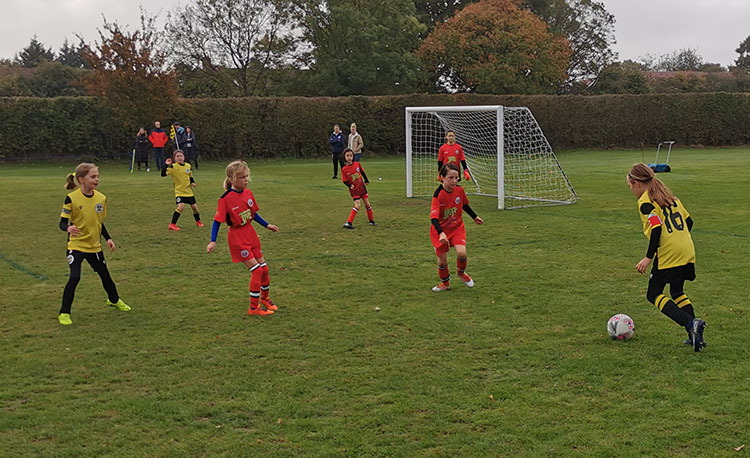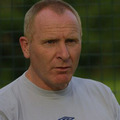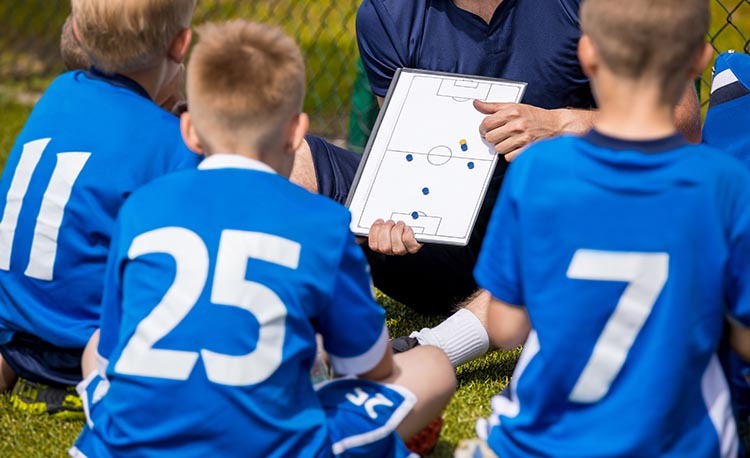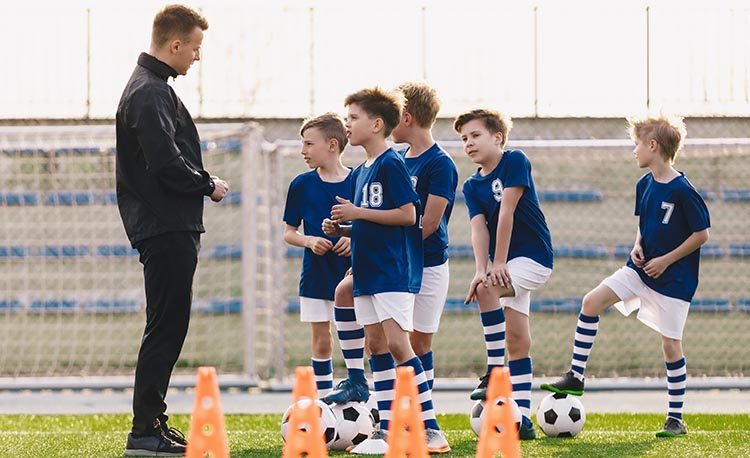How to use the game as the teacher
The game, contrary to the popular phrase, is not necessarily the teacher. However, it does provide a valuable vehicle for youngsters to practice and learn, working out what to do and when, and, as a result, becoming more skilful and effective.
The game, contrary to the popular phrase, is not necessarily the teacher.
However, it does provide a valuable vehicle for youngsters to practice and learn, working out what to do and when, and, as a result, becoming more skilful and effective.
There is no doubt that coaches supporting their young players from the sidelines can be productive. But it is useful to know, in the hurly-burly of a match, what helps and what doesn’t.
It can be very tempting to play the game for your players, especially when you can see the obvious option. But it is important not to disrupt a young player’s natural learning process.
In every youth game, three different kinds of learning are going on at the same time.
Firstly, players are trying to grasp new techniques, like ‘punching’ their passes, using their body shape to receive, going low into tackles or keeping their eyes open to head the ball. These things are all quite easy for a coach to assess.
Secondly, but more difficult to spot, is how the players apply this acquired knowledge in context, on demand and under pressure. This is the ‘knowhow’ of when to do what.
However, these skills need time to develop. You can’t just remember decision-making – it has to be practiced over and over again, and matches are the ideal opportunity to do this.
"It is useful to know, in the hurly-burly of a match, what helps and what doesn’t..."
Finally, there are the habits of, and attitudes towards, learning itself. As Guy Claxton writes in his book, The Future of Teaching, there are key internal questions for the learner:
- Do I like it when things become tricky? If things come easy, am I ready for when they don’t?
- Do I believe that if I can’t do something straightaway I lack the ability?
- When I get stuck, do I try something else? Or just give up and wait to be rescued?
- Do coaches really want me to ask questions about what we’re doing? Or do they just want me to get on with it?
These habits tend to develop over time and are harder for a coach to spot. They involve socialisation and influence.
To be successful, then, a coach needs three corresponding and overlapping skill sets.
When players are working to acquire specific technical knowledge, the coach needs to know their stuff, too, and be a reliable source of accurate information.
They need to be able to explain techniques and concepts in age-appropriate ways, suitable to the aptitude and ability of their players.
They also need good diagnostic and observational skills, to know who has grasped the techniques and who needs more time and help.
When players are striving to become more skilful, the coach needs to know where they are at in terms of their effectiveness within a match.

Different interventions will be needed to promote decision-making and the skills required to execute the right solutions.
The coach needs to watch to see how players are doing in this regard, and when its necessary to offer hints, clues or feedback.
Finally, when broader dispositions towards learning are being formed, a different set of factors – which you can’t teach – come into play. This narrative comes from ‘mood music’ set by the coach, or the club culture.
Players need a secure place to grapple with new ideas; somewhere they can feel confident to have a go at things and make mistakes, knowing the coach has their back and will help them learn the tricks of their trade, through effective practice and learning.
The coach needs ways of assessing that focus through a long audition – not snapshots, but trajectories of improvement, based on a regime of progression, not perfection.
When it comes to matches, constantly shouting instructions from the sideline means players don’t get the chance to make their own decisions or solve the problems the match throws up. We have all heard people yell ‘Don’t let it bounce!’, ‘Pass it!’ or ‘Don’t dribble there!’.
This is really unhelpful. It distracts players in their moment of decision and compromises their opportunities to learn and practice when to do what.
Of course, young players will get it wrong; but making mistakes is part of getting better, especially if their intent is right and the error is simply their inability to execute on that occasion.
So what is helpful?
"We must encourage players to be brave, not safe. They must not be scared..."
Encouragement: Coaches and parents letting players know, in the moment, they are doing things well.
Support: If they make a mistake, encourage them to get back into credit by trying to make the next pass, tackle or header a good one.
Clarity: Keeping things simple with clear information and accurate feedback in team meetings and breaks in play, not while the game is in progress.
Above all, players need to enjoy their matchday experience. When they are happy, they are more likely to remember things, learn more effectively and become more skilful. Positive ‘mood music’ set by the coach and the club culture is imperative.
Working out what to do when is one of the hardest things to learn in our sport. It needs practice, opportunity and time. A matchday performance is just part of this process and the score in development terms is just something scribbled on a piece of paper.
As coaches, we are in the business of character forming. Our players need to learn and practice techniques in a safe space, and enjoy the challenge of rivalries provided by good opponents. We need to support our players and ensure that they know we are on their side.
We must encourage our players to be brave, not safe. They don’t yet know how good they can be.
They must not be scared by the thought of giving things a go, because of some sort of blame game attached to a mistake or result.
Remember, as coaches, we all have the luxury of a ringside seat while the players are caught up in the commotion of combat on the field. Nobody ever made a mistake on the sideline.
Related Files
Newsletter Sign Up
Coaches Testimonials

Gerald Kearney, Downtown Las Vegas Soccer Club

Paul Butler, Florida, USA

Rick Shields, Springboro, USA

Tony Green, Pierrefonds Titans, Quebec, Canada
Subscribe Today
Discover the simple way to become a more effective, more successful soccer coach
In a recent survey 89% of subscribers said Soccer Coach Weekly makes them more confident, 91% said Soccer Coach Weekly makes them a more effective coach and 93% said Soccer Coach Weekly makes them more inspired.
*includes 3 coaching manuals
Get Weekly Inspiration
All the latest techniques and approaches
Soccer Coach Weekly offers proven and easy to use soccer drills, coaching sessions, practice plans, small-sided games, warm-ups, training tips and advice.
We've been at the cutting edge of soccer coaching since we launched in 2007, creating resources for the grassroots youth coach, following best practice from around the world and insights from the professional game.







